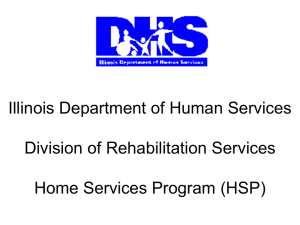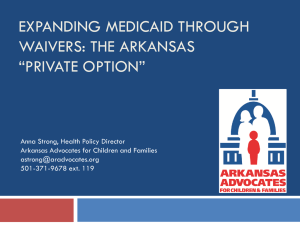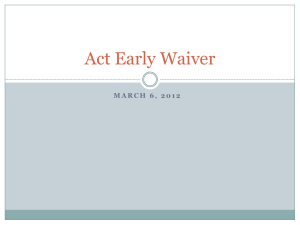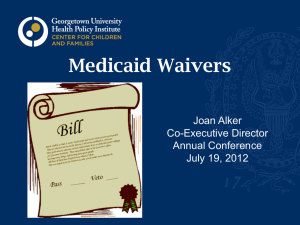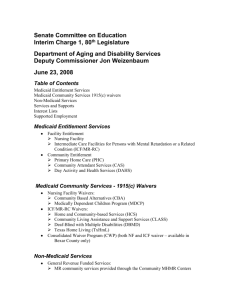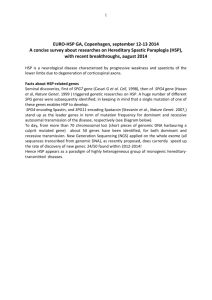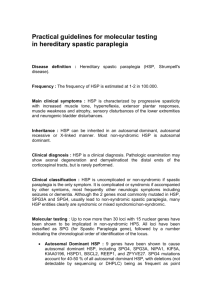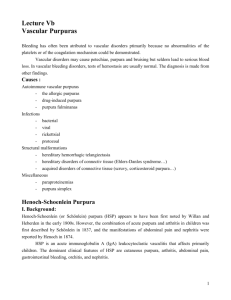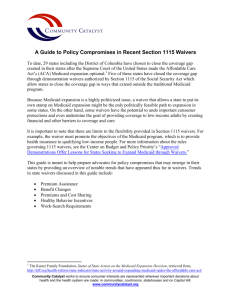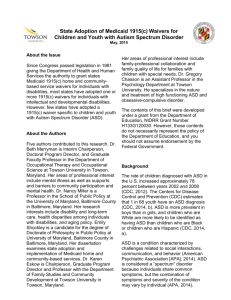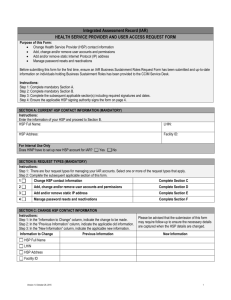T20
advertisement
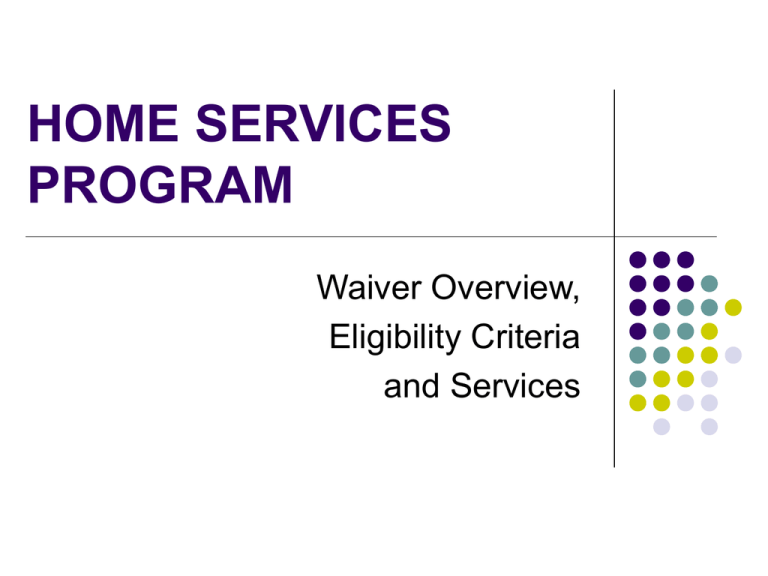
HOME SERVICES PROGRAM Waiver Overview, Eligibility Criteria and Services What is the Home Services Program (HSP)? Illinois Department of Human Services Division of Rehabilitation Services History: 1979 inception, 1982 waiver written 35K customers Purpose HSP consists of 3 different waivers: Persons with Disabilities Persons with Brain Injuries Persons with HIV or AIDS What is a Home and Community Based (HCBS) Waiver? Waivers provide alternatives to nursing home placement for Medicaid recipients The Department of Healthcare and Family Services (HFS) monitors all of the HCBS waivers in Illinois Waivers allows Illinois to recoup a portion of the money spent on direct services to Medicaid recipients What is a Home and Community Based Waiver? (continued) Illinois waiver agencies pay for the services up front and then request reimbursement. Crucial for customers to be Medicaid eligible whenever possible, but not mandatory. 80% of HSP customers are Medicaid recipients, and the state receives 50% reimbursement for waiver expenditures for these individuals. The remaining 20% receive services that are funded directly through state GRF, which are not reimbursed. Limitation Applicants cannot receive services through two waiver program simultaneously. • Other Illinois Waivers: DSCC- Division of Specialized Care for Children DoA- Department on Aging DDD - Division of Developmental Disabilities HFS – Supported Living Facilities Eligibility Criteria United States citizen or lawful permanent resident status Illinois Resident Applicants must be under the age of 60 o o AIDS/BI no age limit Services are reassessed at minimum 1x/year. Severe disability which lasts 12 months or duration of life Eligibility Criteria (cont.) Need for long term care based on scoring of the Determination of Need [DON]. Physician or Neuropsychologist must approve plan of care. Service plan costs must be at or below the Service Cost Maximum. Eligibility Criteria (cont.) Assets cannot exceed $17,500 for a customer over 18 or total family assets cannot exceed $35,000 for a customer under the age of 18. Customer must apply and cooperate with Medicaid application process until an eligibility decision has been reached. Aging Customers in HSP The following chart indicates actual experience of an individual who was served by the Home Services Program over a period of several years. In addition to changes due to aging, this customer also experienced significant decline in her physical functioning due to muscular dystrophy. The chart highlights HSP’s flexibility in meeting the ongoing needs of our customers. 1987 Age 45 1997 Age 55 2007 Age 65 2011 Age 69 MD, poor vision, poor ambulation MD, history of UTI and blurred vision, poor ambulation DON/Plan: 41/68 hours DON/Plan: 42/77 hours MD, anxiety, pneumonia, cataracts, decreased ambulation, heart attack DON/Plan: 49/113 hours MD, another heart attack 2011, oxygen 24/7, W/C dependent DON/Plan: 54/140 hours Cane Cane Cane, W/C ramp EHRS W/C lift, ramp, EHRS HSP Statistics Nyle’s chart goes here. 1200 kids Services Overview Personal Assistant Chosen by the customer or representative; not employed by an agency Customer/representative must be able to direct care Non-skilled care and skilled care Teach, supervise, physically provide services Homemaker Used for customers unable to locate or unable to manage a PA. Worker is assigned to a customer, but is supervised by an agency. Less flexibility in scheduling. Home Health (HH) Types of HH: Certified Nurses Aide [CNA] Licensed Practical Nurse [LPN] Registered Nurse [RN] Physical Therapist [PT] Occupational Therapist [OT] Speech Therapist [OT] Adult Day Care [ADC] Community based setting outside of the home Typically used when a customer’s primary caregiver works during the day and the customer need supervision. Home Delivered Meals [HDM] Meals that are delivered to the customer’s home when the individual is unable to prepare meals, but can feed him/herself. Various community organizations are contracted to provide these meals. Emergency Home Response [EHR] Device rented by the month to enhance customer safety in the home should there be an emergency situation. Can purchase modification/device to enable customer to use EHR system Assistive Equipment Purchase, repair or rental of equipment that is medically necessary and not covered by other insurance: the safety of the customer or caregiver, enables customers to perform activities of daily living independently reduces the cost of HSP services in the home Assistive Equipment Environmental Modifications Structurally changing the home environment for accessibility Enhance independence in ADLs, prevent anticipated increase, reduce services, or health & safety issue for customer or caregivers. $25K limit for a 5 year period (includes assistive equipment purchases) Environmental Modifications Special Populations AIDS and Brain Injury waiver customers have higher SCMs and utilize case managers. Special Brain Injury waiver services include: Habilitation Pre-Vocational Supported Employment Counseling/Psychotherapy Respite Relief for primary caretaker. Can be used all at once or spread out. Up to 240 hour per calendar year. Community Reintegration Program and Money Follows the Person What is CRP? MFP? Program enhancements. Work with local Centers for Independent Living to assist eligible individuals to move out of nursing homes. 445 customers presently served. DoA, DD, DMH also have MFP programs, which are part of the Federal Rebalancing Demonstration for Long Term Care. Referral Process Contact your local DHS/DRS office and make a phone referral. Visit your local DHS/DRS office in person. Have your medical doctor/therapist make a referral. Make a referral on-line at www.dhs.state.il.us
